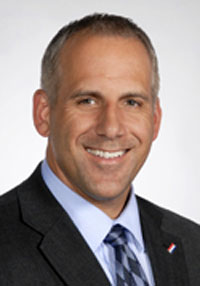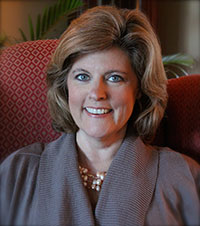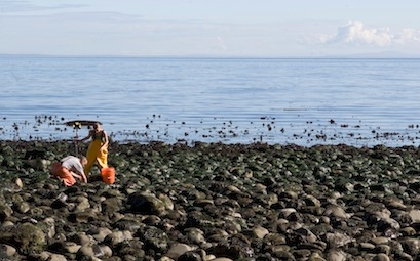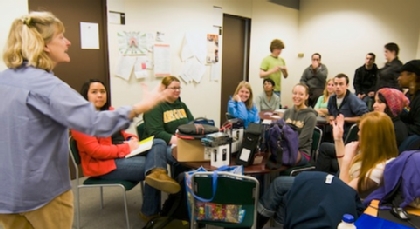Page 46 • (2,187 results in 0.042 seconds)
-
Elizabeth Kaley, Senior Capstone Seminar With the rapid industrialization and heavy reliance on fossil fuels the concentration of Carbon dioxide (CO2) in the Earth’s atmosphere has exponentially
thermally decompose the oligomerized macromolecules into the charcoal scaffolding that supports the iron oxide. We deposited iron oxide from potassium ferrate onto carbon nanofoams, and studied the effect of the deposition time on the electrochemical behavior of the resulting electrodes. Cyclic voltammetry was used to identify the potentials at which the electrodes underwent oxidation and reduction. The carbon nanofoams and rust-coated carbon nanofoams were imaged using scanning electron microscopy (SEM
-

State Farm MBA Executive Leadership Series Fall 2012 Business leaders throughout industry come to PLU to share their insight through the State Farm MBA Executive Leadership Series. Lectures are held in Leraas Hall, Rieke Science Center from 6 to 7 p.m., with refreshments served from…
Officer. Prior to joining Milgard, Gessel gained extensive experience in financial leadership in consumer–packaged goods as Vice President, CFO of Nalley’s Fine Foods, Assistant Vice President of Seafirst Corporation/Bank of America, and as a member of the corporate finance team and leadership development program at Ford Motor Company. Gessel holds a Master of Science in Industrial Administration (MSIA) from Purdue University and a Bachelor of Science in Mathematics from Brigham Young University
-

Pacific Lutheran University hires new Vice President of Marketing and Communications to promote the university’s vision of service, sustainability and leadership. Donna Gibbs, a marketing and communications leader for over 20 years , will become the new Vice President of Marketing at Pacific Lutheran University.…
lived and worked in Malta and Barcelona, Spain, where she served as chief marketing officer for emerging mobile media companies. Prior to moving abroad, Gibbs served as senior vice president for consumer marketing and ecommerce at PlanetOut, a leading media and entertainment company based in San Francisco. She also helped lead the company to a successful IPO in 2004. Earlier, Gibbs was executive vice president at The Weber Group (later Weber Shandwick Worldwide), where she managed six offices and
-
Sabemos que el proceso de la asistencia financiera puede ser confuso, incluso después de haber recibido tu oferta de ayuda financiera.
Submit (Enviar). Se te pedirá que tomes una decisión acerca de los préstamos y el programa de trabajo y estudio que se te ofrecen. Puedes seleccionar Aceptar o Rechazar. Selecciona Submit Decision (Enviar decisión) o, si deseas aceptar toda la oferta que aparece en el formulario original, selecciona Accept Full Amount All Awards (Aceptar el monto total de todas las asignaciones). Una vez que hayas seleccionado Submit Decision o Accept Full Amount All Awards, la pantalla te mostrará el estado actual
-
Students preparing to apply to the social work program should include these courses in their program of study: BIOL 111, ANTH 102, PSYC 101/190, and SOCI 101/190.
, at the same time, social workers are keenly aware of the pain of those not in the mainstream, and are sensitive to the discrepancy between the reality they see and the dream of an ideal society. Social workers have a commitment to service. While there are many considerations that enter into any career decision, the decision to go into social work is usually based upon the desire to contribute to the greater good of all humankind. Why Study Social Work at PLU?Accreditation The BSW program at PLU
-

A summer job that doesn’t suck By Steve Hansen Of all the potentially tedious summer jobs, here’s a new one: spending hours on your knees, rolling over one boulder after another, just to see what’s underneath. For Stephanie Agoncillo ’08 and Melissa Youngquist ’09, this…
saltwater, investigating three closely related species of prickleback fish. The question they were trying to answer: If these fish live under the same rocks, why did they evolve into three distinct species? Nobody knows for sure. So the fieldwork continues, with Agoncillo and Youngquist taking inventory of the fish, and measuring their elevation and location. Some fish go back to campus to be dissected to determine feeding behavior. Rock-rolling included, as summer jobs go, this turns out to be a pretty
-

Uganda Blog: first entry By Theodore Charles ’12 My first travel update comes not from Uganda, but from PLU. I arrived on campus yesterday, Monday January 3, with all of my gear packed, ready for takeoff. I will be shooting still photographs in Uganda, therefore…
during Fall Semester once a week to learn everything from how to edit video to ethical behavior and actions in Uganda. We double and triple checked regulations for the airlines and distributed video recording gear that we recently received from a grant our professor applied for. The energy was palpable while interested students were crammed in the back room of Ingram Hall office space. I am really excited to learn and explore a country that I know only from intensely reading this summer and several
-
Preparation for law school at PLU is an advising system rather than a curriculum of prescribed major/minor or otherwise organized courses.
, and coursework aimed at developing intellectual skills and resources apt to generate success in legal study and practice. Recent successful PLU applicants to law schools have taken such diverse courses as those in the anthropology of contemporary America, social science research methods, American popular culture, English Renaissance literature, news writing and argumentation, recent political thought, international relations, freelance writing, intermediate German, animal behavior, neuropsychology
-
May 1st Join the Mathematics Department to hear the senior capstone presentations.
courses. The SVD allows you to decompose a rectangular matrix into component matrices, unlike spectral decomposition (or eigendecomposition) which can only be applied to square matrices. The component matrices provide interesting and important information about the original matrix, which is why the SVD has many applications, including its use in principal component analysis. 2:30-2:55pm – Hedging: A Method of Financial Risk Management Alex Ellis Investors spend money with the hopes of making a profit
-

veteran: vet-er-an (n) \ ˈve-tə-rən a veteran – whether active duty, retired, discharged, or reserve – is someone who, at some point in their life wrote a blank check made payable to the United States of America for an amount “up to and including their…
intimate bond built that someone who has not served will have a hard time understanding. This bond is built through teamwork, long hours, crappy assignments, complaining about everything together, and also enjoying the off time together. No matter someone’s background, culture, race, religion, or sex, the bond brings us all together. And humor is paramount to making it through all of the rough times. Tami Walsh Women’s Army Corps 1978-1980, Communications Specialist PLU Transcript Specialist, Office of
Do you have any feedback for us? If so, feel free to use our Feedback Form.


